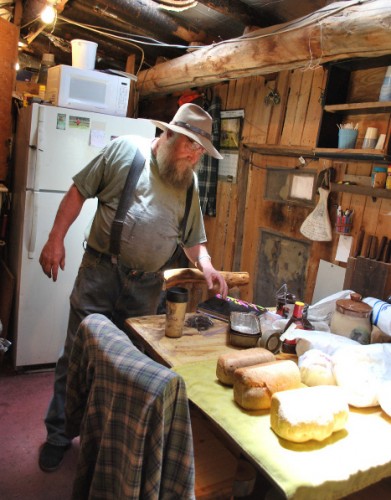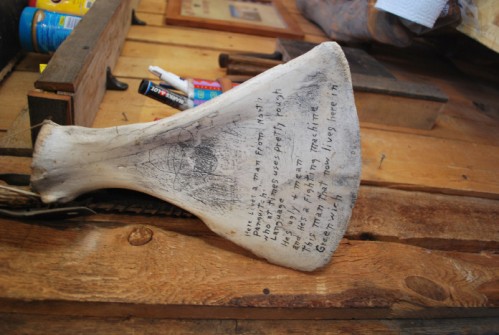Robert Barney is Utah’s last mountain man, and he sat down to share stories and meat with Utah Stories.
“Somebody asked me a while ago, ‘Why do you go by Barney?’ I told him ‘Well, I’m just about as rare as a big purple dinosaur.’ I’m the last of my kind.”
Robert Barney has been a resident of Koosharem, Utah since he settled here in 1953 to start his family. Barney had a wife and four sons, but then disaster struck: in the matter of just a few years his wife and oldest son both died.
Left to raise his boys on his own Barney didn’t let tragedy define the story of his life; instead he took control and raised his sons the same way he had been raised.
 Electricity, running water and indoor plumbing weren’t necessities to Barney – they were luxuries – and he and his boys lived just fine without. Barney moved into what was once a grain mill and spent years renovating the old structure. He added rooms, storage, a new roof and wood burning stoves for warmth. Koosharem’s very cold winters with deep snow must have made life difficult, but a sign in Barney’s cabin reads “If you are lucky enough to be in the mountains, you are lucky enough!”
Electricity, running water and indoor plumbing weren’t necessities to Barney – they were luxuries – and he and his boys lived just fine without. Barney moved into what was once a grain mill and spent years renovating the old structure. He added rooms, storage, a new roof and wood burning stoves for warmth. Koosharem’s very cold winters with deep snow must have made life difficult, but a sign in Barney’s cabin reads “If you are lucky enough to be in the mountains, you are lucky enough!”
Barney showed me his cabin. “This used to be my bedroom until I needed to make a trophy room. Up here is where I installed a septic tank; before that we just had an outhouse.” Today Barney has running water and electricity. He’s still an avid hunter and shared his delicious elk jerky with me. “You could share that with your wife when you get home, but I doubt you’ll make it that far without eating it all.” He was right; it was too good. Sorry, honey.
Engraving on a elk bone reads: “Here lives a man from North Panguitch who at times uses pretty rough language. He’s ugly and mean and he’s a fighting machine. This man that now lives here in Greenwich.”
Barney’s stories and cookouts are famous. He was once an oil field worker, “Until they automated and dumbed-down everything. I like using my brain, but now there’s no brains needed. So I got out of it.” From recent events, it seems the oil industry could use workers “who use their brains.”



